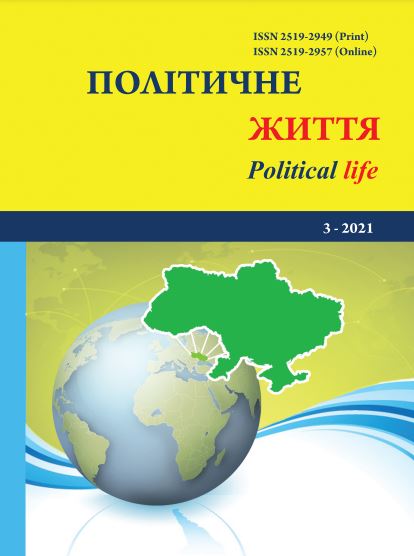Formation and Manifestations of the Political Trigger "Crimea"
DOI:
https://doi.org/10.31558/2519-2949.2021.3.7Keywords:
trigger; mass media; Crimea; occupation; annexation; politics; society; political triggerAbstract
The paper is aimed to study the formation and manifestations of the political trigger "Crimea". The historical and value characteristics of the events of 2014 are presented. Direct attention is paid to the analysis of the categorical base, in particular, the concepts of trigger, political trigger, discourse, types of discourse are distinguished. The paper presents the understanding of the status of Crimea in different discourses: sacred and profane. Emphasis is placed on associative connections and interpretations in media texts.
It is determined that trigger analysis in the future is useful in the study of opposing discourses, as value triggers will appear more often. It was found that historical events are the most commonly used interpretations in sacred discourse. Most "sacred" texts contain some references to the historical context. It is determined that the movement of network communities beyond virtuality and their transformation into full-fledged political actors depends on their size (small communities are easier to organize), as well as on the interpretive potential of a value-political trigger. The more the political is in the trigger, the less likely it is to implement the scenario of taking the community beyond virtuality. Conversely, if the trigger, in addition to the political, has the potential for conflicting interpretations that appeal to higher identities, the greater the likelihood of organizing small network communities as political actors.
It is substantiated that the struggle between discourses does not lead to a complete victory of one of them. Each discourse establishes its specific meanings in the minds of individuals and the collective consciousness of communities. Within the sacred discourse there is its own sacred-profane discourse. At the same time, politics cannot exist outside the profane discourse.
References
Кримнаш – Намкриш: Як змінювалися думки росіян у 2014 році. URL: https://24tv.ua/krimnash__namkrish_yak_zminyuvalisya_dumki_rosiyan_u_2014_rotsi_n528224
Говорити про нелегальність виборів у Криму категорично важливо. Укрінформ, 16.03.2018. URL: https://www.ukrinform.ua/rubric-crimea/2423465-govoriti-pro-nelegalnist-viboriv-u-krimu-kategoricnovazlivo-ekspert.html.
Росії не вдасться спростувати, що Крим це Україна – Британія в ООН. Укрінформ, 18.03.2021. URL: https://www.ukrinform.ua/rubric-crimea/3210349-rosii-ne-vdastsa-sprostuvati-so-krim-ce-ukraina-britaniav-oon.html.
Джейн Псаки. Lb.ua. URL: https://lb.ua/tag/13559_dzhen_psaki
Тригери в маркетингу та продажах: що це таке і як їх використовувати. AG MARKETING TEAM. URL: https://ag.marketing/.
Анексія Криму. Головні наслідки для України. Главком. 27.03.2014. URL: https://glavcom.ua/publications/124364-aneksija-krimu.-golovni-naslidki-dlja-ukrajini-doslidzhennja.html.
Байден: Крим – це Україна, ми будемо разом протистояти агресії Росії. Українська правда. 26.02.2021. URL: https://www.pravda.com.ua/news/2021/02/26/7284859/.
Руденко А., Євчин Д., Дорогань А. Від Тузли до анексії. Чому Росії вдалося захопити Крим у 2014- му? Радіо Свобода. 20.02.2021. URL: https://www.radiosvoboda.org/a/chomu-rosiji-vdalosia-zaxopytykrym/31106434.html.
Новицький О. Концепти застосування праймінгу та тригеру ЗМІ в політичному житті. Політичне життя, 2020. №4. С.69-74.

